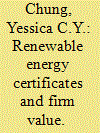| Srl | Item |
| 1 |
ID:
177499


|
|
|
|
|
| Summary/Abstract |
This study provides empirical evidence on the association between board attributes and corporate social responsibility (CSR) engagement—as well as between CSR engagement and corporate performance—in the global energy sector. The data for the period of 2011–2018 was obtained from Thomson Reuters. The results indicate that board diligence and CSR committees are robust drivers of CSR performance, as proxied by the composite environmental, social, and governance (ESG) score along with its three individual indicators. While board independence is more influential in boosting the aggregate ESG score and the governance indicator, the board's gender diversity is more influential in environmental and governance indicators. However, higher CSR performance does not guarantee higher financial performance—as proxied by both market and accounting performance. We provide theoretical and practical implications, to guide regulators and energy firms in ensuring the sustainable development of the sector.
|
|
|
|
|
|
|
|
|
|
|
|
|
|
|
|
| 2 |
ID:
179866


|
|
|
|
|
| Summary/Abstract |
Multinational firms operate in multiple national jurisdictions, making them difficult for any one government to regulate. For this reason the firms themselves are often in charge of their own regulation, increasingly in conjunction with international organizations by way of public-private governance initiatives. Prior research has claimed that such initiatives are too weak to meaningfully change firms’ behavior. Can public-private governance initiatives help firms self-regulate, even if they lack strong monitoring or enforcement mechanisms? I take two steps toward answering this question. First, I introduce a new measure of firms’ performance on ESG (environmental, social, and governance) issues: the extent to which the firms issue public responses to claims of misconduct from civil society actors. Second, I argue that public-private governance initiatives allow firms to benefit from the legitimacy of their public partners, lowering the reputational cost of transparent response. Employing novel data on firm responses to human rights allegations from the Business and Human Rights Resource Center, I find that membership in the largest and most prominent initiative, the United Nations Global Compact, significantly increases firms’ propensity to respond transparently to stakeholder allegations. These results suggest a limited but important role for public-private initiatives in global governance.
|
|
|
|
|
|
|
|
|
|
|
|
|
|
|
|
| 3 |
ID:
192751


|
|
|
|
|
| Summary/Abstract |
The Renewable Energy Certificate (REC) has been considered as an innovative technology for a green society. Many firms look to reduce carbon emissions and improve their environmental, social, and governance (ESG) performance using RECs. However, the impact of REC purchases on the value of firms remains unclear. This study investigates the effect of REC purchases on the stock return and volume of all REC buyers in Taiwan between 2017 and 2021. The sample consists of 266 REC transactions in the trading market. We find a positive effect of firms’ REC purchases on its stock returns in manufacturing but not the service industry. Moreover, the frequency of REC purchases is an important factor in the relationship between REC purchase and firm value. This study also investigates the underlying mechanisms of these effects. We find that public attention paid to environmental pollution is the most crucial factor associated with positive stock return and volume of a firm, while ESG disclosure is negatively associated with returns and volume.
|
|
|
|
|
|
|
|
|
|
|
|
|
|
|
|